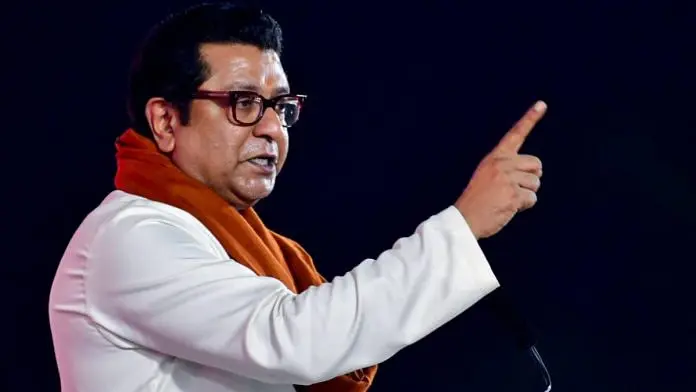
MNS chief Raj Thackeray faces backlash and legal complaint under the National Security Act
The Spark That Lit the Fire: What Raj Thackeray Said
Raj Thackeray Controversial Remark – During a joint rally with Shiv Sena (UBT) chief Uddhav Thackeray at Mumbai’s NSCI Dome on July 5, 2025, Maharashtra Navnirman Sena (MNS) chief Raj Thackeray made a statement that has since spiralled into a full-blown controversy.
Addressing his supporters amid the ongoing Marathi language row, Thackeray said:
“Be it a Gujarati or anyone else here, they must know Marathi. But there is no need to beat people for that if they don’t speak Marathi. Yet, if someone does drama, you must hit them below their eardrums.”
He followed up with a remark that drew even sharper criticism:
“If you beat someone, don’t make a video. Let the person beaten up tell that he has been beaten up; you don’t need to tell everyone.”
This statement, interpreted by many as an endorsement of violence and a call to conceal it, triggered immediate backlash. Critics argue that it promotes vigilantism, undermines rule of law, and encourages mob justice while attempting to dodge accountability through media silence.
Legal Storm: Complaint Filed Under National Security Act
On July 14, a group of three senior advocates, Pankajkumar Mishra, Nityanand Sharma, and Aashish Rai, filed a formal complaint against Raj Thackeray, demanding action under the National Security Act (NSA).
The complaint, submitted in Marathi, accuses Thackeray of:
- Delivering hate speech
- Inciting communal violence
- Encouraging physical assault and social humiliation
- Undermining constitutional protections
The advocates urged authorities to:
- Register a case under NSA
- Investigate Thackeray’s statements thoroughly
- Prevent future remarks that could disturb public peace
- Hold MNS workers accountable for alleged assaults and coercion
The complaint also references recent incidents involving MNS workers allegedly attacking non-Marathi-speaking individuals, including a migrant auto-rickshaw driver in Palghar, who was reportedly beaten and forced to apologize publicly.
This legal move has reignited debates around freedom of speech vs. incitement, and the threshold for prosecuting public figures under national security laws.
Political Fallout and Public Reaction
Thackeray’s remarks have drawn condemnation from across the political spectrum:
- Opposition leaders accused him of promoting hate and divisiveness
- Civil society groups called for stronger safeguards against inflammatory rhetoric
- Social media erupted with hashtags like #StopHatePolitics and #AccountabilityNow
Many users expressed concern over the normalization of violence in political discourse. Others pointed out the dangerous precedent of encouraging supporters to avoid recording violent acts a tactic often associated with organized vigilantism and mob behavior.
Legal experts weighed in, noting that while political speech is protected, incitement to violence is not. The NSA, typically reserved for threats to national security, has rarely been invoked against politicians — making this case a potential landmark.
Meanwhile, MNS supporters defended Thackeray, claiming his words were misinterpreted and taken out of context. They argue that he was merely emphasizing Marathi pride and discouraging unnecessary drama not promoting violence.
Language, Identity, and the Politics of Power
At the heart of this controversy lies a deeper issue: the Marathi-Hindi language divide and the politics of regional identity.
Mumbai has long been a melting pot of cultures, but tensions have flared in recent years over demands that migrants learn Marathi. MNS and Shiv Sena have historically championed Marathi pride, often clashing with Hindi-speaking communities and migrant workers.
Thackeray’s speech taps into this sentiment, but critics argue that it crosses the line from cultural advocacy to xenophobic incitement.
The complaint against him also calls for a broader inquiry into:
- Targeted violence by MNS workers
- Social coercion and humiliation
- Threats to freedom of expression and equality
Advocates emphasized that the Constitution guarantees life, liberty, and dignity to all citizens regardless of language or origin. They urged the administration to uphold these rights and prevent divisive rhetoric from escalating into violence.
Final Thoughts
Raj Thackeray’s controversial remarks have opened a Pandora’s box of legal, political, and ethical questions. As the complaint under the National Security Act moves forward, the nation watches closely not just to see whether Thackeray will face consequences, but to reflect on the limits of political speech, the responsibility of public figures, and the fragility of communal harmony.
This incident is more than a headline it’s a mirror to the challenges India faces in balancing regional pride with national unity, and free speech with social responsibility.
Stay updated with the latest news on Rapido Updates. Keep yourself updated with The World, India News, Entertainment, Market, Automobile, Gadgets, Sports, and many more